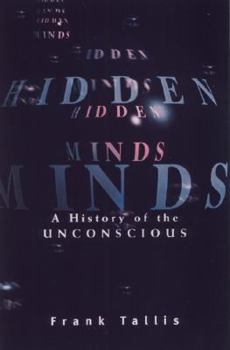Hidden Minds: A History of the Unconscious
Select Format
Select Condition 
Book Overview
The concept of the unconscious has staged a comeback. New research, employing brain scans and other techniques, has shown that the unconscious is not only real but indispensable. Hidden Minds traces... This description may be from another edition of this product.
Format:Hardcover
Language:English
ISBN:1559706430
ISBN13:9781559706438
Release Date:September 2002
Publisher:Arcade Publishing
Length:208 Pages
Weight:0.65 lbs.
Dimensions:0.8" x 6.4" x 9.6"
Customer Reviews
5 ratings
The unconscious is the "third blow" after Copernicus and Darwin
Published by Thriftbooks.com User , 14 years ago
An intriguing book about the illusion of free will and of a personal self. He also describes how and why we hide our intention (self-interest) from others by hiding it from ourselves.
A Keystone Work in the Pursuit of Truth
Published by Thriftbooks.com User , 15 years ago
If you keep in mind that this book is actually a thesis, you will appreciate the careful thoroughness that is employed throughout the entire book. It is a careful, fair-handed history of our understanding of the unconscious/subconscious mind. The author pulls no punches as he presents the facts and I must say that his well-supported conclusions have made a life-time impression on me. I will not spoil it for you; you owe it to yourself to discover and understand the true nature of the mind of man according to the best information available. I found this truth to be absolutely liberating.
Excellent overview of the concept of the Unconscious
Published by Thriftbooks.com User , 21 years ago
I read this book on a whim - it looked interesting in the new books area of the local public library - and was enthralled. Tallis begins with the Locke/Leibniz disputes of the 18th century and moves to the present. I especially appreciated the attention he gave to Romanticism's views of the unconscious - I had ascribed much to Jung that actually began long before Analytical Psychology - and the career of Janet, whose immense contributions to the concept of the Unconscious have been undervalued as Freud got most of the attention. I enjoyed Tallis' observation that Jung's final personal apotheosis into something like the Wise Old man was the kind of inflation that he tried to cure patients of! All in all, I would heartily recommend this book to anyone wanting an overview of concepts of the Unconscious- it's only deficiency is that it's too short - less than 200 pages, but packed with information, analysis and human insight.
Efforts to identify and classify the unconscious mind
Published by Thriftbooks.com User , 21 years ago
Hidden Minds is a history of the unconscious offering the non-specialist general reader with a fine synthesis which argues that the unconscious is one of the three big ideas of modern science. It may have lost favor recently, but new research in neuroscience and psychology has supported not only the concept of the unconscious mind, but identified its importance in psychology and the arts. The history of efforts to identify and classify the unconscious mind makes for an involving account.
Long Time No See
Published by Thriftbooks.com User , 21 years ago
Frank Tillis has done a noble job of showing just how important the idea of the unconscious has been in philosophy and science since the time of Plato. He traces its articulation through Romanticism, psychoanalysis, information theory, computer modeling, cognitive and perceptual studies, and neuroscience. Not only has he got it right, but he shows that at least some aspects of Freud's work have been vindicated by the seemingly contrary empirical approaches of the latter half of the twentieth century. Of course, the term "empirical" is a loaded one, and its authoritative presence is often invoked without deep philosophic reflection. For example, why is a phenomenological analysis of dream material less empirical than a study of the delay response between a brain stimulation and a conscious correlary to that stimulation? Or why is a reductive information model more empirical than one that deals with archetypal formations within the unconscious? Tallis seems to assume an implicit (and narrow) understanding of conceptual and experiental warrant (i.e., the empirical) that philosophically reduces the self to a passing cluster of febrile forms of consciousness that quickly return to the dark origin from which they have come. Specifically, in his conclusion to the book he quickly dismisses quantum theory and its evocation of non-located consciousness as entailing a reductio ad infinitutum that posits something analogous to a conscious homunculus within the brain that stands behind the curtain generating macro-consciousness. Further, he argues that neuroscience and the Buddhist doctrine of an-atman (no self) are conceptually isomorphic. But what about a Hindu notion of atman (infinite self) in its stead, which could really explain the out of the body experiences he mentions? In fact, it may well be the case that quantum theories of consciousness can only work on a Hindu model of the infinite realm and scope of consciousness within and without the finite self. And what about the correlation of the unconscious and telepathy (fairly well documented)? I do strongly agree with Tallis on his call for a unified theory of the correlation between consciousness and the unconscious, although it will most likely come from philosophy rather than the conjunction of dynamic psychology and neuroscience. And I further agree that the evidence for the unconscious is so overwhelming that it has the same status as the evidence for evolution. If fact, evolutionary psychology, which he describes very well, is one place where we can expect great advances (in spite of some crucial gender issues that must be dealt with). My suspicion is that the unconscious is much bigger than Tallis believes, and that the prospects of consciousness are less confined than he asserts. His constricted view is seen, for example, in his slightly distorted understanding of Jung's probes into the unconscious. Specifically, he accuses Jung of being a victim of psychic inflation rather





